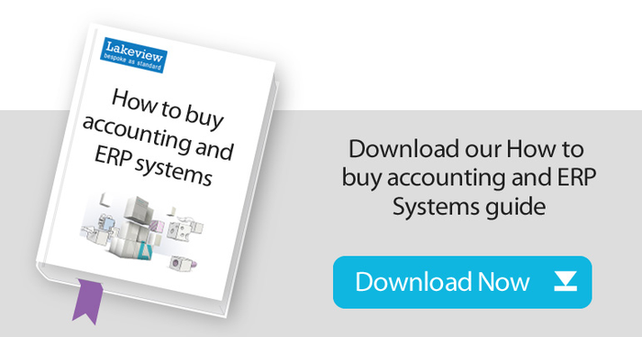 When selecting an Enterprise Resource Planning (ERP) package there are so many available options for users to choose from. The selection process can be a bit of a minefield and unfortunately there is rarely a correct answer and information to make an informed choice may not be immediately clear for every business.
When selecting an Enterprise Resource Planning (ERP) package there are so many available options for users to choose from. The selection process can be a bit of a minefield and unfortunately there is rarely a correct answer and information to make an informed choice may not be immediately clear for every business.
The end user normally goes into the selection process looking to improve information flow, increase efficiencies and reduce their costs. Ultimately the ideal selection should really be based on three main factors.
- How closely the solution matches your company and operations (now and in the future)
- How well the ERP system consultants, trainers and implementers understand their business
- The costs involved in completing a successful ERP implementation
Ultimately, you, the customer needs to know that an ERP solution can fit your business, work efficiently and cope with your own industry-specific requirements. You also need to know that you can rely on your supplier and its staff.
Finally you need to make sure that the price of the solution makes logical sense when weighing up the benefits.
Generic ERP solutions tend to work on the basis of ‘one-fits-all’ and sector specific solutions are aligned to work with specific industries and companies. However, it seems that it’s only bespoke ERP vendors that are daring to use the ‘s’ word, no the other ‘s’ word – ‘specialisation’.
When authors sit down to design an ERP package there are a number of design choices they need to make. By its very nature ERP is a complicated beast. Considerations, such as: which country the software will be used in, what industry they will be used in and any number of other factors need to be considered.
In using generic ERP systems, there is a trade-off between trying to appeal to all and making the system as relevant as possible to various end-users who might possibly suit the product.
A solution that can support accountants in Australia, clothes distributors in Brazil and a food manufacturer in the UK, may do the job, but will almost certainly need to be customised or you will be forced to make do in a lot of areas.
As a result, there are a multitude of available products. Some are generic, some specialise at a high level and some specialise in certain sectors. For example, you have:
- ERP one-fits-all – no-matter the business
- ERP for manufacturers
- ERP for distributors
- ERP for professional services
- ERP for food manufacturers in the UK (requiring nutrient details, shelf-life management, batch traceability and so-on)
From your point of view as a customer, the ideal solution should be a product that fits your business model as closely as feasibly possible. The one-fits-all solution will most likely work with your business, but their business will have to come up with work-arounds, adapt it and customise it. In essence, there will be some level of restrictions to the business. The site specific solution should start on a much closer footing.
Ultimately companies are looking to improve their operations and not restrict them. Flexibility and adaptability should be key facets for any new system, but the system itself should almost inherently understand the company that will be deployed to. If the solution needs weeks of customising so that it can fit into the new company, then you could argue whether its flexibility or adaptability is really irrelevant.
So why do the generic packages have large share of the market?
Well basically there is safety net in picking a well-known brand. It feels secure when you say Microsoft or Sage or whomever and to a certain extent if you truly are in a very generic business then a generic solution may be suitable for your business. This is of course as long as stays simple and doesn’t change.
It’s quite similar to the 80’s and 90’s when people bought IBM. Basically, people didn’t get sacked when they bought IBM.
Beneath is a table outlining the common disadvantages and advantages sector specific ERP solutions:
Sector specific ERP
| Advantages | Disadvantages |
| The solution is much more likely to match your business from the start | The company and product is less likely to be well-known. |
| Less time spent customising during implementation | |
| Consultants likely to understand business and industry | |
| No need to rely on resellers with no authority over the future of the product | |
| Much more likely to have a solution that is developed in line with your own business | |
Fundamentally this whole topic really comes down to whether or not the end user believes that the solution should match their requirements from the start as closely as possible.
Lakeview specialise, and believe in specialisation. If you would like to discuss your sector-specific requirements please give us a call.
Keen to understand the best route to finding the accounting and ERP solution that best fits your business? Download Lakeview’s free guide: How to buy ERP and accounting systems.
Related articles
The post Sector specific ERP vs. generic ERP appeared first on Lakeview Blog | ERP providers to UK businesses.























